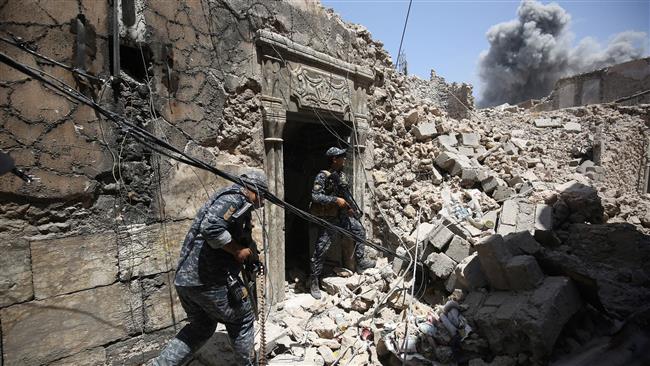
RNA - The media bureau of the Iraqi Joint Operations Command announced in a statement on Wednesday that army troopers had established full control over Hadarat al-Saada and al-Ahmadiyya neighborhoods northwest of Grand al-Nuri Mosque, where purported Daesh ringleader Ibrahim al-Samarrai aka Abu Bakr al-Baghdadi announced the formation of the group's so-called caliphate back in 2014.
Daesh extremists late on June 21 blew up the 12th-century Hadba (Hunchback) minaret along with the Grand al-Nuri Mosque.
Iraqi authorities and officials from the US-led coalition purportedly fighting Daesh terrorists said the destruction of the site, sometimes referred to as Iraq’s Tower of Pisa, is a sign of the extremists’ imminent loss of Mosul.
Earlier on Wednesday, Federal Police Forces Commander Lieutenant General Shaker Jawdat said security forces were moving through al-Farouq district and advancing towards Bab al-Toub, Serjkhana, Bab al-Jadid and Bab al-Lakash areas in the heart of Mosul’s Old City.
He revealed that government troops were in control of more than 70 percent of Daesh’s last bastion in Mosul.
Jawdat noted that army troops were engaged in fierce battles with an estimated 300 Daesh militants in the Old City.
Speaking in an exclusive interview with Press TV on Friday, Iraq’s federal police chief voiced concerns over Daesh terrorists’ use of Mosul residents as human shields.
The militants force women and children to cover them in the streets as they know that Iraqi security forces will not target civilians, he said.
Jawdat also stressed that when the terrorists lose a region, they use human shields to secure their way out of the area.
Iraqi army soldiers and volunteer fighters from the Popular Mobilization Units, commonly known by their Arabic name, Hashd al-Sha’abi, have made sweeping gains against Daesh since launching the Mosul operation on October 17, 2016.
The Iraqi forces took control of eastern Mosul in January after 100 days of fighting, and launched the battle in the west on February 19.
An estimated 862,000 people have been displaced from Mosul ever since the battle to retake the city began nine months ago. A total of 195,000 civilians have also returned, mainly to the liberated areas of eastern Mosul.
847/940